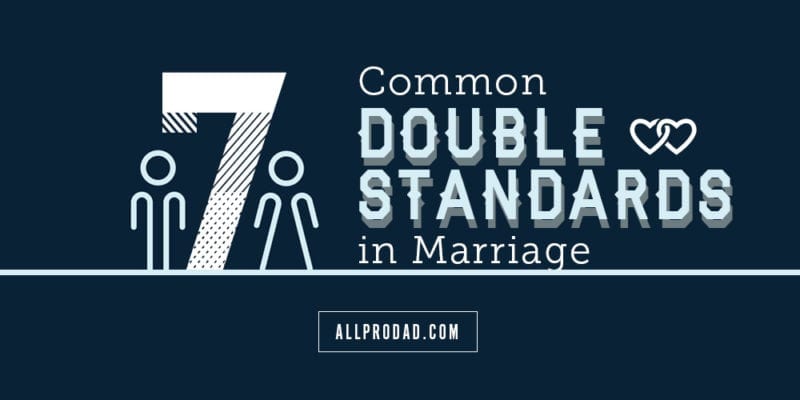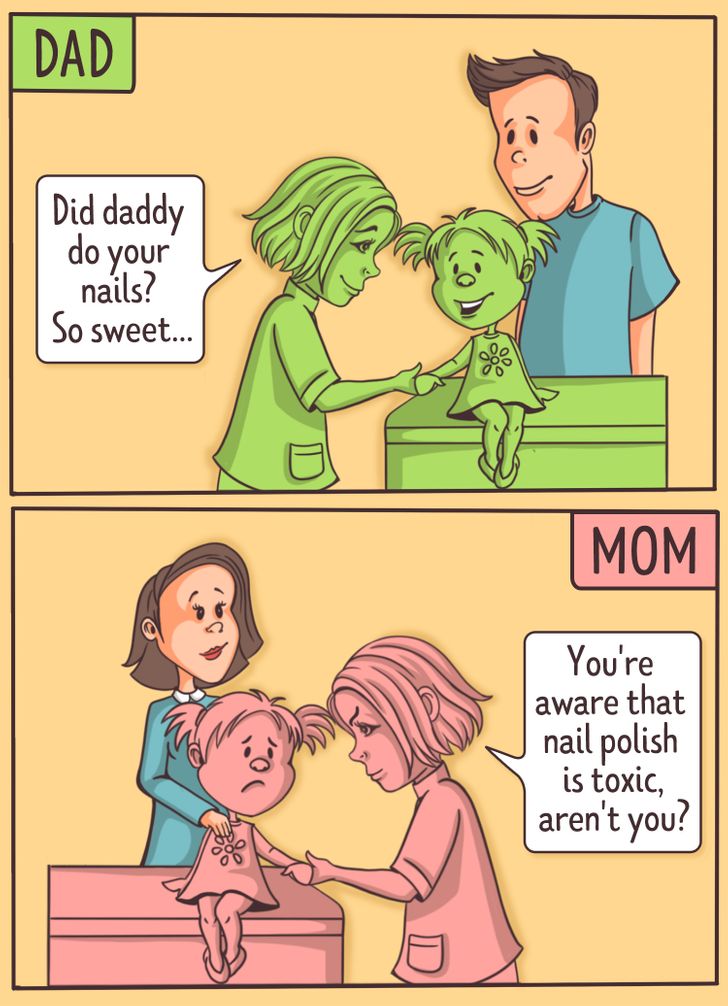What Is The Double Standard Husband? Unpacking Unequal Expectations In Relationships
Detail Author:
- Name : Prof. Chaz Pollich IV
- Username : kovacek.royce
- Email : ypagac@gmail.com
- Birthdate : 1987-08-17
- Address : 43667 Mraz Causeway Apt. 698 Camdenshire, DE 63584-4896
- Phone : +1-202-904-0746
- Company : Hermann, Bednar and Glover
- Job : Textile Dyeing Machine Operator
- Bio : Ut eos at quibusdam velit. Placeat esse dolorem laboriosam quia velit hic. Suscipit perferendis debitis accusamus autem.
Socials
instagram:
- url : https://instagram.com/lavern.flatley
- username : lavern.flatley
- bio : Amet omnis modi hic atque maiores. Aliquid laboriosam nihil unde.
- followers : 1474
- following : 1361
tiktok:
- url : https://tiktok.com/@lavern_flatley
- username : lavern_flatley
- bio : Tempora perferendis esse ab at incidunt deleniti.
- followers : 5711
- following : 1683
facebook:
- url : https://facebook.com/lavern_flatley
- username : lavern_flatley
- bio : Dolor minima quia laborum suscipit occaecati debitis repellendus.
- followers : 1049
- following : 91
linkedin:
- url : https://linkedin.com/in/lavern.flatley
- username : lavern.flatley
- bio : Omnis non quam eligendi ducimus.
- followers : 1637
- following : 2408
twitter:
- url : https://twitter.com/lavern_flatley
- username : lavern_flatley
- bio : Sed fuga illum quis natus itaque aut. Animi sed distinctio dolores fuga.
- followers : 1296
- following : 2792
Have you ever felt like the rules in your relationship just don't quite add up? Maybe it seems like one person gets a pass for things the other would never get away with. That feeling, that nagging sense of unfairness, often points to a double standard. It's a common, yet really hurtful, dynamic that can slowly chip away at the foundation of a partnership, leaving one person feeling undervalued and pretty much misunderstood.
When we talk about what is the double standard husband, we're essentially talking about a situation where a man applies different sets of rules, expectations, or judgments to himself compared to his partner. For instance, he might expect his partner to be home at a certain time but feel perfectly fine staying out late himself. Or, perhaps, he demands complete transparency from her regarding her finances or social life, yet keeps his own affairs rather private. This kind of imbalance, honestly, can create a lot of tension and resentment over time, making it hard for both people to feel truly connected and respected.
It's not always about malice, you know. Sometimes, these double standards creep in almost without anyone noticing, often rooted in traditional beliefs, societal norms, or even personal insecurities. But regardless of the cause, recognizing and addressing these uneven expectations is truly vital for building a partnership that feels genuinely fair and supportive. This discussion aims to shed some light on what these standards look like, why they might appear, and what you can do to foster a more balanced and happy connection with your partner, because everyone deserves that, don't they?
Table of Contents
- What Exactly Is a Double Standard?
- The Subtle Ways Double Standards Appear
- Why Do Double Standards Happen?
- Understanding the Nuances of Expectation
- The Impact of Double Standards on a Relationship
- Addressing Double Standards: Steps Towards Fairness
- Frequently Asked Questions
What Exactly Is a Double Standard?
A double standard, at its heart, is a rule or principle that is unfairly applied in different ways to different people or groups. When we talk about what is the double standard husband, it means he holds his partner to one set of behaviors or expectations while allowing himself to operate under a different, often more lenient, set. This isn't just about minor disagreements; it's about a fundamental imbalance in how fairness and accountability are dished out in the relationship. So, it's pretty much a situation where what's good for the goose isn't considered good for the gander, you know?
Think about it like this: if one person is expected to always pick up after themselves, but the other consistently leaves messes without consequence, that's a double standard. It can show up in big ways, like financial control, or in small, everyday actions, like who gets to decide what to watch on TV. The core issue is the unequal application of rules, which can feel incredibly frustrating and diminish a partner's sense of worth and equality in the bond. It really does make a relationship feel a bit lopsided, doesn't it?
The Subtle Ways Double Standards Appear
Double standards don't always announce themselves with a grand flourish; they often sneak into a relationship quite subtly, like quiet little shifts in expectation. Sometimes, they're so ingrained in how someone grew up or what they learned from society that they don't even realize they're doing it. But for the person on the receiving end, these subtle differences can feel like a constant, low-level hum of unfairness. Let's look at some common areas where these uneven rules tend to pop up, because recognizing them is truly the first step toward change, isn't it?
Money Matters
This is a really common spot for double standards to show their face. A husband might demand to know every penny his partner spends, scrutinizing her purchases, yet he might spend freely without discussing his own expenditures or even hiding them. Or, perhaps, he expects her to contribute equally to household bills, but he keeps the majority of his income for his personal whims. This creates a power imbalance, making one person feel like a child asking for an allowance, and that's not a good feeling, is it?
Social Life and Friendships
Here's another area where things can get pretty uneven. A husband might go out with his friends whenever he pleases, staying out late, but he might expect his partner to check in constantly or even limit her time with her own friends. He might feel jealous or suspicious if she has male friends, yet maintain close friendships with women himself. This can really isolate a partner and make her feel controlled, which is honestly a big problem in any healthy connection.
Household Responsibilities
This one is a classic. A husband might expect his partner to handle the bulk of household chores, cooking, and childcare, even if she also works full-time. He might say he'll "help out" rather than acknowledging these tasks as shared responsibilities. So, he's "helping" in his own home, which is a bit of a strange way to put it, isn't it? This can lead to one partner feeling like a maid or a parent, rather than an equal partner in the home.
Emotional Expression
Sometimes, a husband might expect his partner to be emotionally available and understanding, always ready to listen to his problems, but he might shut down or become distant when she tries to share her own feelings. He might dismiss her worries as "overreactions" while his own frustrations are seen as totally valid. This creates a very lonely space for the partner who feels their emotions aren't truly valued or heard, which is a very painful experience, to be honest.
Personal Appearance and Hobbies
This can manifest as a husband commenting on his partner's appearance, perhaps suggesting she dress a certain way or lose weight, while he himself pays little attention to his own grooming or health. Similarly, he might dedicate significant time and money to his hobbies, expecting support for them, but then criticize or discourage his partner's interests as frivolous or time-wasting. It's a bit like saying "do as I say, not as I do," which is never a great message in a partnership, is it?
Why Do Double Standards Happen?
Understanding why double standards appear is a really important step in addressing them. It's rarely about someone waking up and deciding to be unfair. More often, these behaviors are deeply rooted in a mix of personal history, societal expectations, and sometimes, plain old insecurity. For instance, a husband might have grown up in a home where gender roles were very rigid, leading him to unconsciously adopt those same patterns. Or, maybe, he feels a need to exert control because of his own anxieties, projecting those onto his partner. It's pretty complex, actually.
Societal norms, too, play a massive role. Traditional ideas about masculinity often suggest men should be strong, unemotional providers, while women should be nurturing and accommodating. These outdated notions can lead to husbands expecting their partners to fit into certain molds while they feel free to operate outside them. Sometimes, it's also about a lack of empathy or simply not thinking from the other person's perspective. They might not truly grasp how their actions impact their partner, and that's a common stumbling block, isn't it?
Understanding the Nuances of Expectation
When we look at how expectations play out in relationships, it's a bit like examining different measures of precision, in a way. Just as certain numerical concepts can be expressed with varying degrees of exactness or within different ranges of acceptance, so too can the standards we hold ourselves and others to. Sometimes, what appears to be a clear, single measure, like a "double standard," isn't truly about two distinct, equal measures at all. It's often more about a skewed application of different scales, or perhaps, a misjudgment of what constitutes fairness, like when a term meant to imply greater exactness doesn't quite live up to its name.
Consider how some concepts are designed to capture a broader scope or a finer detail, and how a misapplication of these different levels can lead to unexpected results. Similarly, in relationships, applying expectations with varying "resolutions" or "tolerances" for different people can lead to significant friction. It's a bit like trying to fit a precise measurement into a broad estimate; the outcome feels off, you know? This difference in how "rules" are processed or how "allowances" are granted can really highlight the core problem of a double standard, where one person is held to a far more demanding or less forgiving measure than the other, and that's just not right, is it?
The Impact of Double Standards on a Relationship
The presence of double standards can really corrode a relationship from the inside out. When one partner consistently feels like they're being held to a different, tougher set of rules, it chips away at their self-worth and trust. They might start to feel resentful, angry, or even depressed. This unequal treatment can lead to a significant power imbalance, where one person feels constantly on guard, walking on eggshells, or simply unable to be their authentic self. It's a truly draining experience, honestly.
Communication also suffers immensely. The partner who feels unfairly judged might stop sharing their thoughts and feelings, fearing criticism or dismissal. This creates emotional distance, making genuine connection incredibly difficult. Over time, this can lead to a breakdown of intimacy and a sense of isolation within the relationship, even when two people are living under the same roof. It's a pretty heavy burden to carry, and it certainly doesn't foster a loving environment, does it?
Ultimately, persistent double standards can lead to the erosion of respect, which is a fundamental pillar of any healthy partnership. If one person doesn't feel respected, they can't truly feel loved or valued. This can cause the relationship to become strained, unhappy, and sometimes, frankly, unsustainable. Nobody wants to be in a partnership where they constantly feel less than, and that's a truth we all understand, isn't it?
Addressing Double Standards: Steps Towards Fairness
Recognizing a double standard is the first brave step, but addressing it takes courage, patience, and a commitment from both partners to truly work towards fairness. It's not always an easy conversation, but it's a really necessary one for the health and longevity of the relationship. Remember, the goal isn't to blame, but to create a more balanced and respectful partnership. Here are some steps you can take to move towards a more equitable dynamic, because everyone deserves a fair shot, don't they?
Open and Honest Talk
Choose a calm moment when you both have time to talk without interruptions. Express how you feel using "I" statements, focusing on the impact of the behavior rather than accusing your partner. For example, instead of saying, "You always expect me to clean up," try, "I feel overwhelmed when I'm the only one doing the housework, and it makes me feel like my efforts aren't valued." Explain specific examples clearly and calmly. It's about expressing your experience, you know, not just pointing fingers. Learn more about relationships on our site.
Be prepared to listen to your partner's perspective, too. They might not be aware of the double standard or understand how their actions are affecting you. Sometimes, these patterns are deeply ingrained, and it takes time and effort to unpack them. The goal is to find common ground and solutions together, not to win an argument. This can be a tough conversation, but understanding these dynamics is a step towards a healthier bond. You can find more insights on effective communication here.
Setting Clear Boundaries
Once you've had an open conversation, it's important to establish clear, mutually agreed-upon boundaries. These are the new rules that will apply equally to both of you. For instance, if the issue is about social time, you might agree that both partners will communicate when they'll be out late, or that both have equal opportunities for personal time with friends. These boundaries need to be specific and understood by both of you, so there's no room for misinterpretation, which is pretty important, isn't it?
It's also important to discuss what happens if these boundaries are crossed. Accountability is key to making these new rules stick. This isn't about punishment, but about ensuring that both partners are committed to upholding the new standards. It might take a little while to adjust, but consistency is really vital for building new, fairer habits. So, you're basically building a new framework together, which is a good thing, right?
Seeking Outside Help
If direct conversations aren't leading to change, or if the double standards are deeply entrenched and causing significant distress, considering professional help can be incredibly beneficial. A couples therapist or counselor can provide a neutral space for both partners to express themselves and learn healthier communication patterns. They can also help identify the root causes of the double standards and guide you both towards more equitable behaviors. It's a really valuable resource, honestly, for getting things back on track.
Sometimes, an outside perspective is exactly what's needed to break old habits and see things more clearly. A therapist can offer tools and strategies that you might not discover on your own, helping you both navigate these challenging conversations with more grace and effectiveness. It shows a real commitment to the relationship to seek this kind of support, and that's a powerful statement, isn't it? For more information on relationship dynamics and support, you might find resources like The Gottman Institute helpful.
Frequently Asked Questions
Here are some common questions people often ask about this topic:
What are examples of double standards in a relationship?
Examples often include a husband expecting his partner to handle all household chores while he does none, or demanding to know her whereabouts at all times while he comes and goes freely. It could also involve him criticizing her spending habits while he spends without accountability, or expecting her to be emotionally supportive without reciprocating. Basically, it's when one person has rules that don't apply to the other, which is pretty unfair, isn't it?
Why do men sometimes have double standards?
Double standards in men can stem from various sources, including traditional upbringing where gender roles were rigidly defined, societal pressures that reinforce outdated notions of masculinity, or even personal insecurities that lead to a need for control. Sometimes, it's simply a lack of awareness or empathy regarding how their actions affect their partner. It's often not malicious, but rather a deeply ingrained pattern that needs to be brought to light, you know?
How do you fix a double standard in a relationship?
Fixing a double standard begins with open and honest communication, where both partners express their feelings and concerns using "I" statements. It involves setting clear, mutually agreed-upon boundaries and ensuring accountability for upholding them. If direct conversations aren't enough, seeking guidance from a couples therapist can provide valuable tools and a neutral space for resolution. It really takes a joint effort and a willingness to change, doesn't it?


